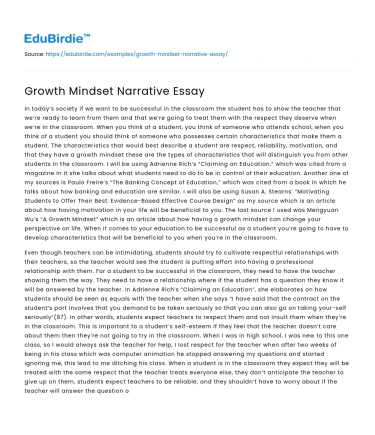Introduction
The concept of a growth mindset has garnered significant attention in educational psychology, with its roots tracing back to the pioneering work of Carol Dweck. A growth mindset, as opposed to a fixed mindset, posits that intelligence and abilities can be developed through dedication and hard work. This paradigm shift offers a transformative perspective on personal development, fostering resilience and a love for learning. The implications of adopting a growth mindset extend beyond the classroom, influencing various aspects of life and contributing to overall success. This essay seeks to explore the narrative of growth mindset within educational contexts, examining its impact, challenges, and potential solutions through real-life examples and scholarly discourse.
Understanding Growth Mindset: Theoretical Foundations and Practical Implications
The theoretical underpinnings of a growth mindset are rooted in the belief that intellectual abilities and talents can be cultivated through effort and perseverance. Carol Dweck, a prominent psychologist, first introduced this concept, contrasting it with a fixed mindset, where individuals perceive their capabilities as innate and immutable. According to Dweck (2006), "the view you adopt for yourself profoundly affects the way you lead your life." This assertion underscores the transformative potential of adopting a growth mindset, as it empowers individuals to embrace challenges, persist in the face of setbacks, and see effort as a path to mastery.
Save your time!
We can take care of your essay
- Proper editing and formatting
- Free revision, title page, and bibliography
- Flexible prices and money-back guarantee
In educational settings, the adoption of a growth mindset can lead to significant improvements in student outcomes. Research indicates that students who possess a growth mindset are more likely to embrace challenges, show resilience in the face of difficulties, and achieve higher academic success (Yeager & Dweck, 2012). For instance, a study conducted by Blackwell, Trzesniewski, and Dweck (2007) demonstrated that students who were taught to believe in the malleability of intelligence exhibited greater academic progress compared to their peers with a fixed mindset. This evidence highlights the practical implications of fostering a growth mindset in educational environments, where teachers play a crucial role in shaping students' perceptions of their abilities.
Despite the promising potential of a growth mindset, its implementation is not without challenges. Critics argue that the emphasis on effort can sometimes overshadow the importance of effective strategies and resources necessary for learning (Sisk et al., 2018). Additionally, the risk of misinterpretation or oversimplification of the concept may lead to unrealistic expectations, where effort alone is seen as the sole determinant of success. To address these concerns, it is essential to provide a balanced perspective, acknowledging the role of external factors while emphasizing the importance of strategic effort and learning from mistakes.
Real-Life Applications and Challenges: Case Studies and Counterarguments
The application of a growth mindset philosophy extends beyond theoretical discourse, finding relevance in real-world educational scenarios. Several educational institutions have successfully integrated growth mindset principles into their curricula, yielding positive outcomes. For example, the "Mindset Works" program, developed by Dweck and her colleagues, has been implemented in various schools across the United States, aiming to instill growth-oriented attitudes among students. This program emphasizes the importance of embracing challenges, learning from criticism, and persisting in the face of adversity.
However, the transition from theory to practice is not always seamless. Critics of the growth mindset approach argue that it may inadvertently perpetuate educational inequalities. For instance, students from disadvantaged backgrounds may face systemic barriers that hinder their ability to fully benefit from a growth mindset philosophy. As noted by Snipes and Tran (2017), without addressing these structural issues, the impact of a growth mindset may be limited, as it fails to account for the broader socio-economic context influencing student performance.
Furthermore, the narrative surrounding growth mindset has been subject to scrutiny, with some scholars questioning its universal applicability. The cultural context plays a significant role in shaping individuals' perceptions of intelligence and effort. In collectivist societies, where communal values and interdependence are emphasized, the growth mindset framework may need to be adapted to align with cultural norms (Heine et al., 2001). This highlights the importance of considering cultural nuances when implementing growth mindset interventions, ensuring that the approach resonates with diverse student populations.
Conclusion
In conclusion, the narrative of a growth mindset presents a compelling framework for enhancing educational outcomes and fostering personal development. Through its emphasis on effort, resilience, and adaptability, a growth mindset empowers individuals to overcome challenges and unlock their full potential. While the implementation of growth mindset principles in educational settings has shown promising results, it is essential to address the challenges and criticisms associated with this approach. By acknowledging the role of external factors, cultural contexts, and strategic effort, educators can effectively harness the power of a growth mindset to create inclusive and supportive learning environments. As the discourse on growth mindset continues to evolve, further research and practical applications will be crucial in refining its impact and ensuring its relevance in diverse educational contexts.






 Stuck on your essay?
Stuck on your essay?

